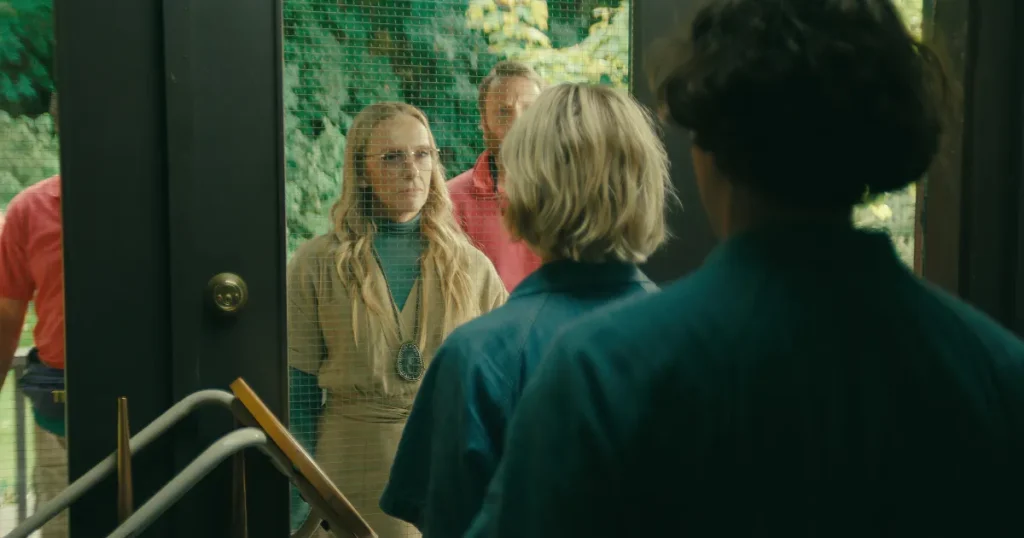Netflix’s Wayward: A Haunting Journey Through the Dark Side of Troubled Teen Rehabilitation
Netflix’s limited series “Wayward,” which premiered on September 25, takes viewers into the unsettling world of Tall Pines Academy, a facility for troubled teens that harbors sinister secrets beneath its pleasant facade. Created by and starring Mae Martin, the show assembles a stellar cast including Alyvia Alyn Lind, Sydney Topliffe, Toni Collette, and Sarah Gadon to explore the psychological manipulation and power dynamics at play in the troubled teen industry. What begins as a story about two friends—Leila (Lind) and Abbie (Topliffe)—planning their escape from the academy evolves into a complex narrative about identity, trauma, and the blurry line between healing and control. As the series builds to its dramatic conclusion, viewers witness characters making life-altering choices that leave them questioning what freedom truly means.
The series opens with Leila breaking into Tall Pines Academy to help her friend Abbie, setting the stage for their shared mission of escape. Throughout the season, we watch as their paths diverge—Abbie finds potential freedom with the help of police officer Alex (Martin), while Leila grows increasingly drawn to the academy’s enigmatic head teacher Evelyn (Collette). This psychological split culminates in the finale’s most heartbreaking moment: when freedom is finally within reach, Leila chooses to stay behind at Tall Pines. The decision isn’t sudden but carefully crafted throughout the season, as Lind explains: “I was figuring out how to show the distance between her and Abbie growing, the closeness between her and Evelyn becoming her being enthralled by Evelyn… I didn’t want it to seem like it was coming out of nowhere when she decided to stay at the school.” Meanwhile, Abbie’s escape comes at a cost when her love interest Rory sacrifices himself so she can get away, emphasizing the steep price of freedom in this world.
The finale delivers several shocking turns beyond Leila’s decision to remain at Tall Pines. Alex is kidnapped by Evelyn, who attempts to force him to make “the leap”—a disturbing process involving drug injection and hypnosis that seems central to her methodology. Just when it appears Evelyn’s control is absolute, one of her former followers intervenes, leaving Evelyn’s fate ambiguous. This power vacuum creates the most unsettling development of all: Alex’s wife Laura (Gadon), who had been working to dismantle Evelyn’s influence, seamlessly steps into the role of cult leader herself. The former followers who once served Evelyn now rally around Laura as she prepares to deliver her and Alex’s baby, suggesting the cyclical nature of power and control that defines the series’ dark world.
The show masterfully plays with perception and reality, particularly in its conclusion. After witnessing what appears to be Alex’s escape with Abbie and his newborn child, viewers discover this was merely a dream—he remains trapped in the system that has now fallen under his wife’s control. The only character who truly achieves freedom is Abbie, making her the sole success story in a narrative filled with psychological imprisonment. This blurring of reality reflects the psychological manipulation at the heart of Tall Pines, where characters and viewers alike struggle to distinguish between authentic healing and indoctrination. The series leaves us questioning whether anyone can truly escape the mental confines of such institutions, even when physically removed from them.
One of the most compelling elements of “Wayward” is its willingness to embrace ambiguity, particularly regarding Leila’s past. Throughout the season, the show hints that Leila may have been involved in her sister’s death, but deliberately avoids providing definitive answers. As Lind explains, “I love that there isn’t a solid answer… It’s really important to show how when you go through a major trauma like that, it is very true that your mind tries to block out as much of it as possibly can.” This psychological realism adds depth to Leila’s character and explains her vulnerability to Evelyn’s manipulation. When Evelyn guides Leila through a “memory” of killing her sister, it becomes the perfect leverage to keep her at Tall Pines—regardless of whether the memory is authentic or implanted. “Whether she did or whether she did not, she will always feel that guilt for being there,” Lind notes, adding her personal belief that “she didn’t kill Jess. I think that that was Evelyn walking her through and trying to make her believe that to make her stay.”
Though marketed as a limited series, “Wayward” concludes with enough unresolved questions to fuel speculation about a potential second season. The ambiguous fate of Evelyn, Laura’s new role as a cult leader, Alex’s apparent imprisonment, and Leila’s future at Tall Pines all provide rich territory for further exploration. Abbie’s adjustment to life outside the academy similarly presents compelling narrative possibilities. As Lind expresses, “I would love to do a season 2… to really figure out what happens to Leila, what happens to Evelyn, Abbie’s new life and just the entire entirety of where everybody ends up.” Whether or not Netflix continues the story, “Wayward” succeeds in delivering a thought-provoking examination of institutional power, psychological manipulation, and the complex nature of healing from trauma. The series leaves viewers with uncomfortable questions about the thin line between therapeutic guidance and coercive control—questions that remain relevant long after the credits roll.


